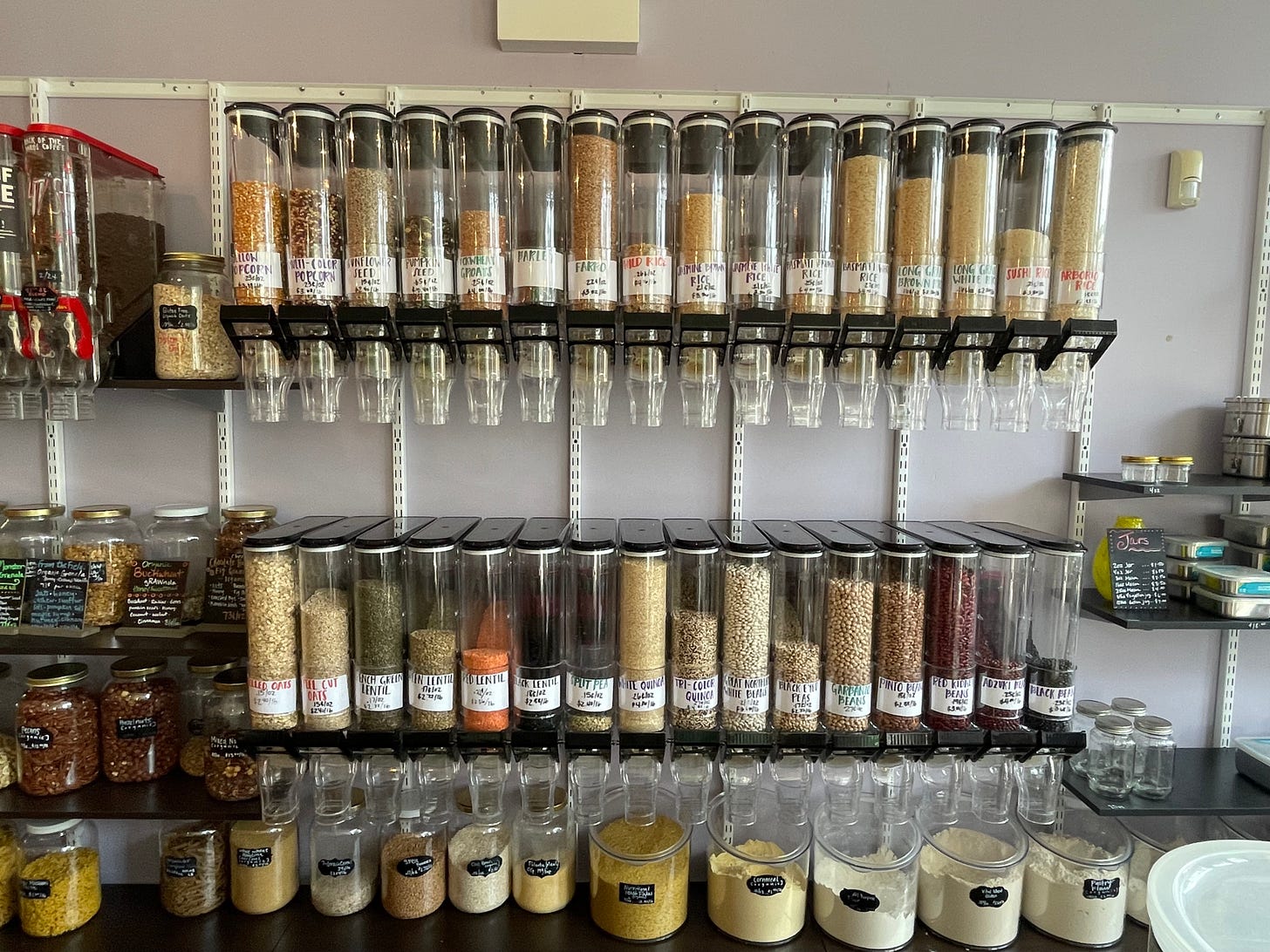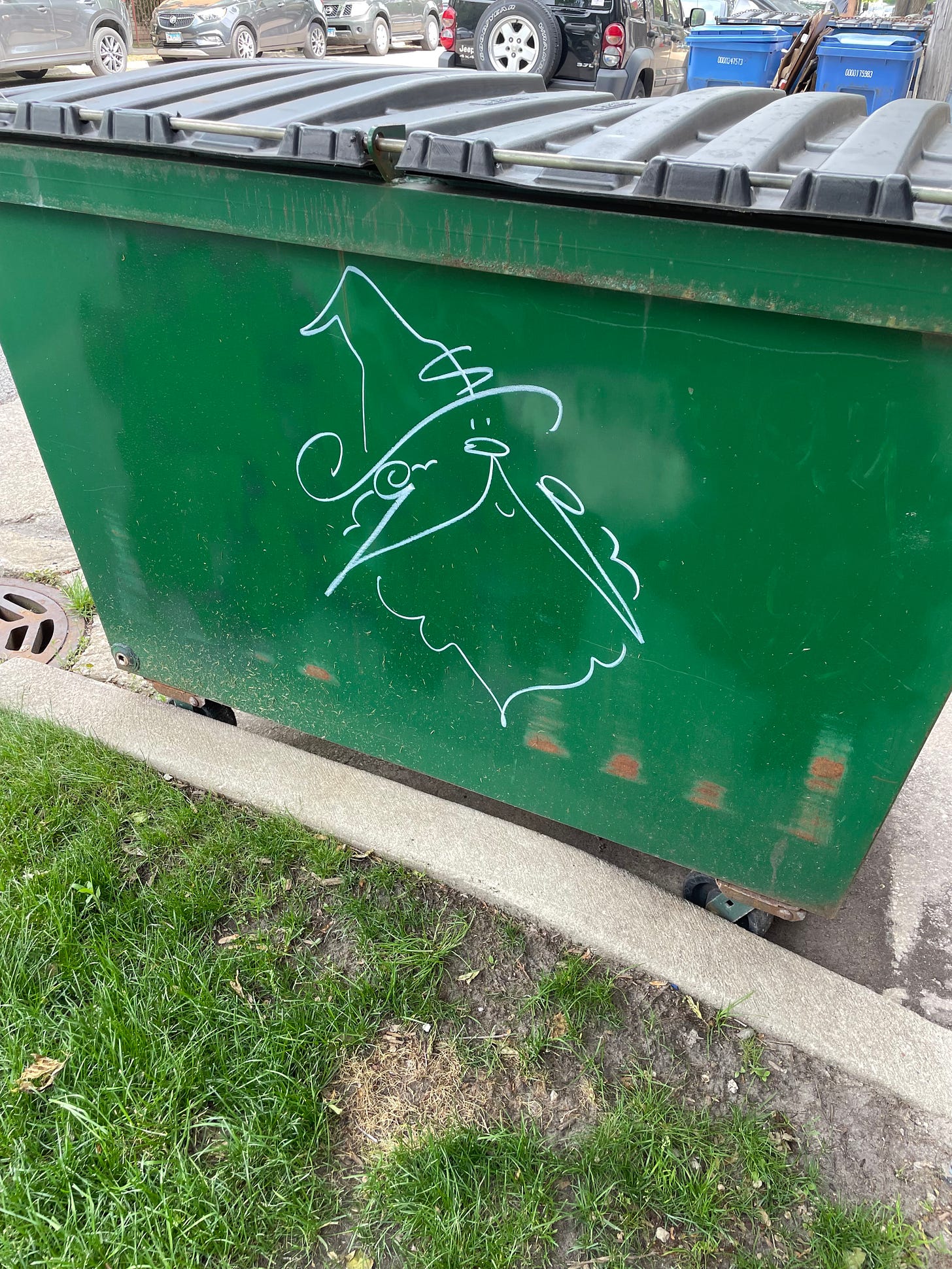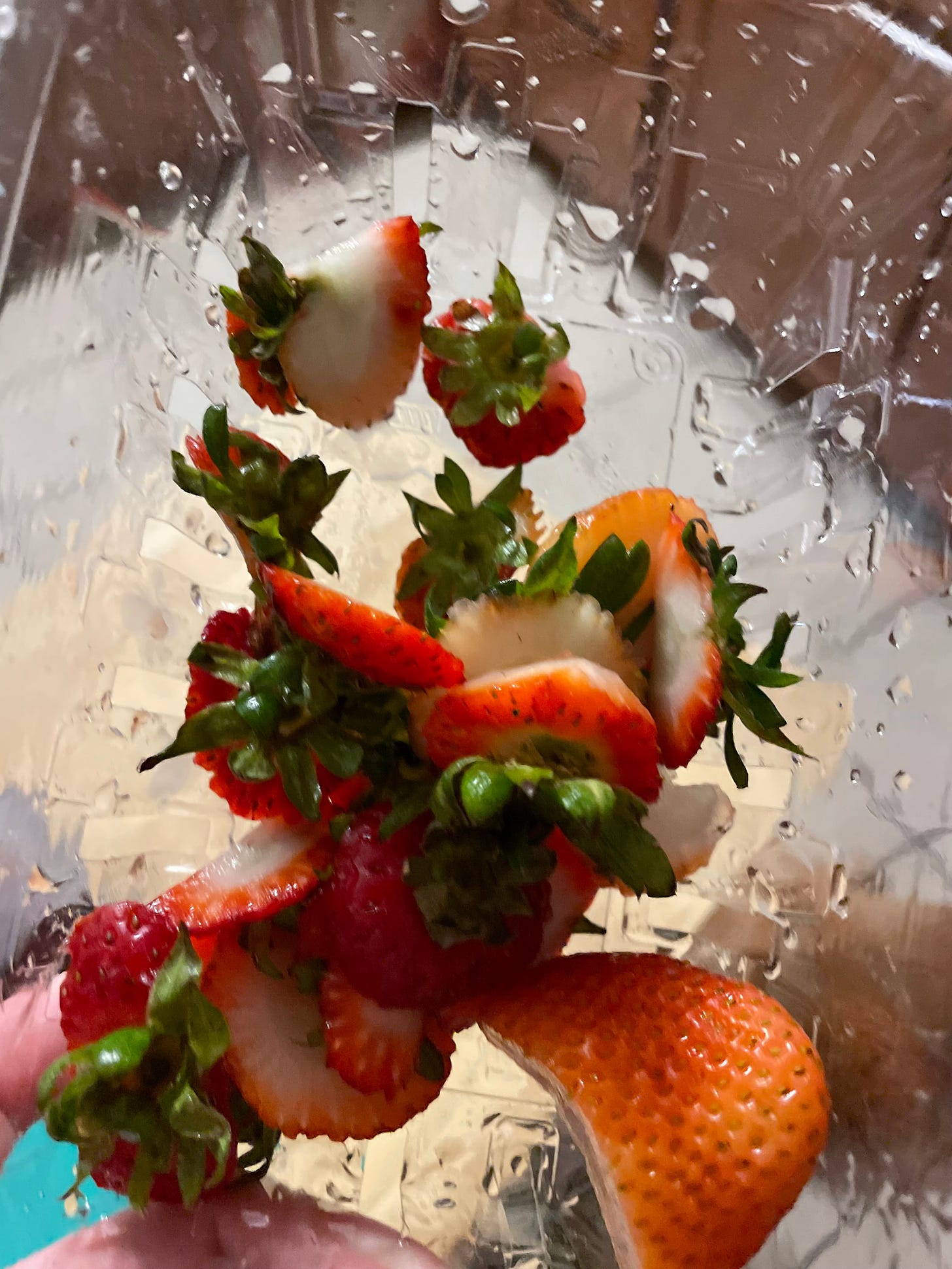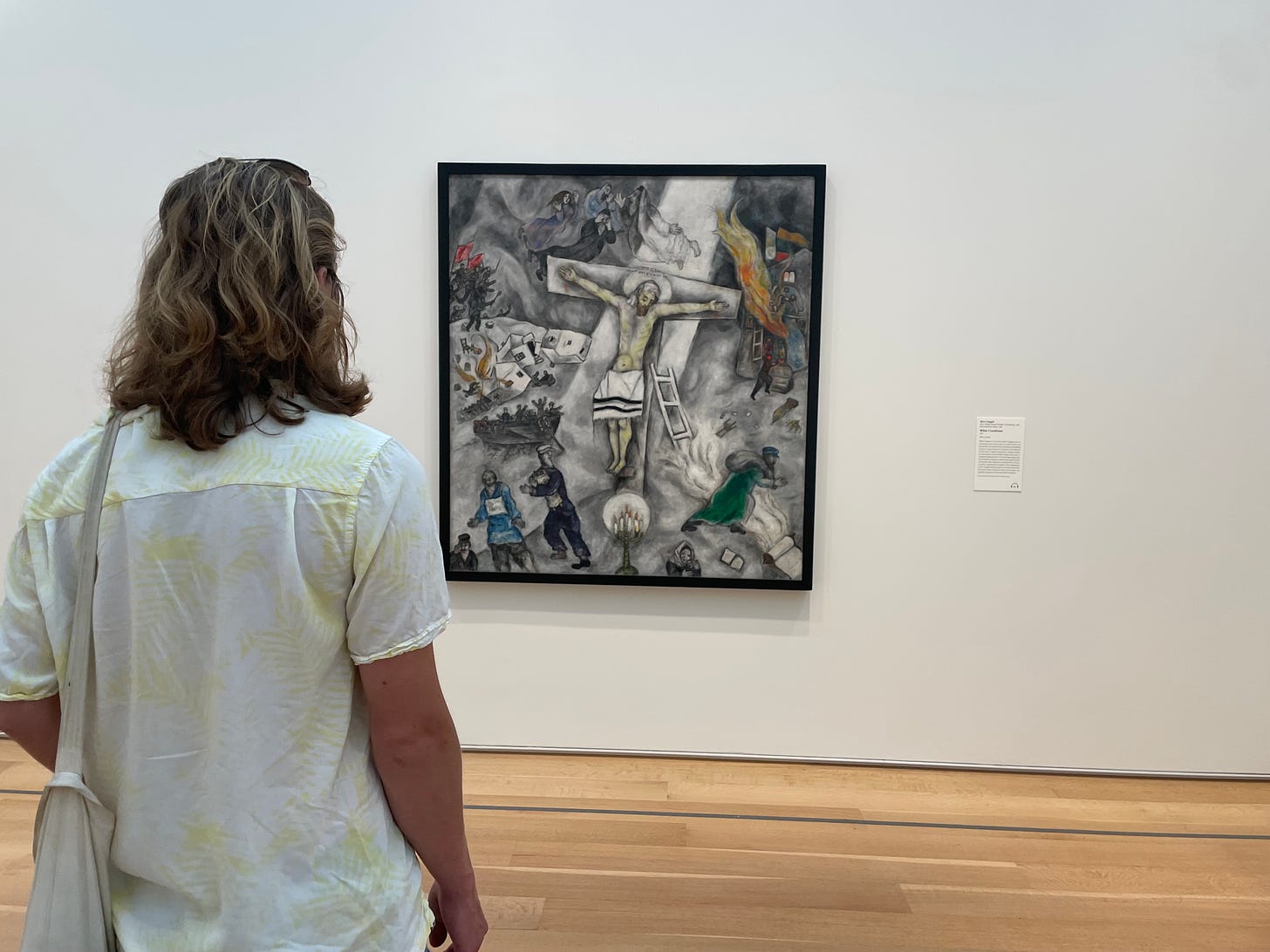Do Not Scorn the Symbolic Act
We're efficient in some areas so we can make meaning in others. Efficiency is not a virtue.
I was taking a pizza box to the dumpsters behind my apartment. The trash truck was there, and one of the workers saw my cardboard box, and, assuming I was heading to recycling, said, “Put it in here,” gesturing to the trash. I was planning to put it in the trash anyway because it was too greasy to be recycled, but I just nodded and tossed it in. Then he said, “They all go to the same place.”
The same place! How sad. Regardless, for months afterwards, I continued to sort my recycling into paper bags and carry it farther than the trash dumpster, out to the recycling one.
I wish the recycling bin collected only cardboard, paper, and metal and actually did recycle them. The benefits of recycling pay off for those items; less so for plastic. Or I wish there were a half dozen small bins, one for each type of recycling. Then everyone would have to sort everything: here is my #2 plastic cup, here is clean, dry cardboard, here are the empty beer bottles and the rinsed-out jam jar. I would like to recycle if it were effective.
Humans used to re-use more stuff. I read Craeft last year and was struck by how every bit of farm labor was used and reused as much as possible. Alexander Langlands, the author, writes, “The goal, in being craefty, is not to use as much as possible of the technology and resources you have at your disposal but to use as little as possible in relation to the job that needs undertaking” (38). He sows grass and bales it into hay which feeds animals and thatches roofs (39, 180). He trims hedges which protect his garden and direct livestock to the right pastures and provide a biodiverse, living spot for little bugs and animals (112, 119). When he wanted to make a bee skep from local materials, guess what he used? Hay he’d grown from grass and bramble cane he’d cut from his hedge (106).
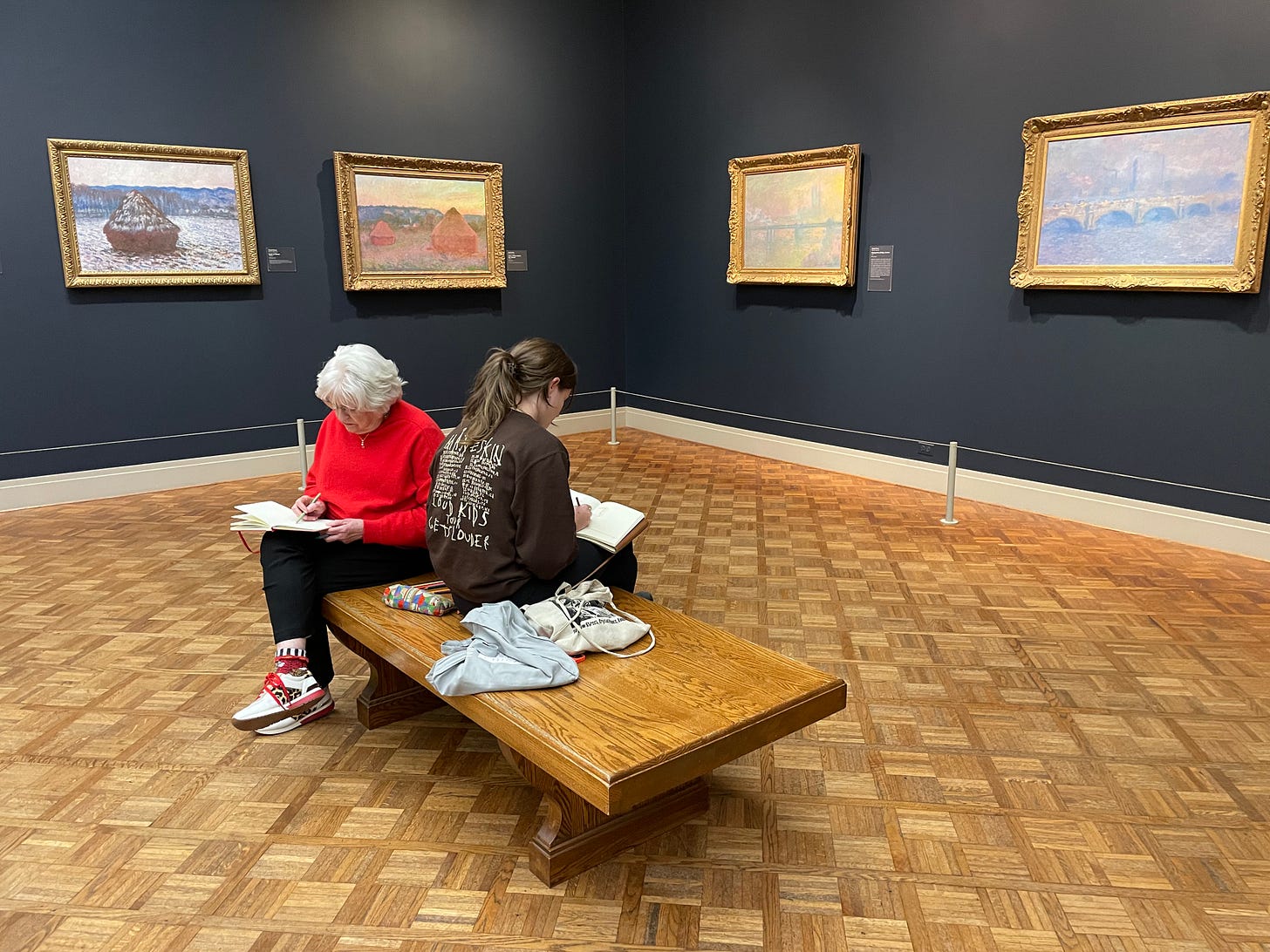
I compost, and was talking with my dad about it—at his grandparent’s farm, they composted food scraps and burned the trash. I love to think about how little trash I would have to use for it to be practical for me to burn it. I love to think about how natural the items I used would need to be.
I wish recycling worked at my apartment, and everywhere. I wish I could take empty jars to a general store and fill them with dry goods and put my produce in a wicker basket and get my occasional meat wrapped in paper. I wish the jar of honey that Tucker bought me at the farmer’s market wasn’t the only container in my kitchen that I can return to its source to be used again. I wish I made less trash.
Speaking of the general store. One time I was waiting to pay, and the man in front of me told me he was getting sunscreen and a towel for his daughter whom he was driving down to go to college in Florida that weekend. He told me Dunkin’ hadn’t been letting him use his own cup for coffee recently. He was kind and interesting and I didn’t feel like talking to him and ten minutes later he learned he hadn’t measured the weight of the jar before filling it with sunscreen and I blamed the lady behind the counter for that in my head, it’s confusing if you haven’t been there before, and clearly he hadn’t, and finally he pays and leaves, and five more minutes after that I was back in my car, steaming with the wait, and I realized—oh. Waiting is part of the experience of general-store shopping. Talking to people and bumping into each other and pumping out shampoo and scooping dried beans and granola and popcorn kernels while you wait in a slow-moving line is not efficient. That’s why Piggly Wiggly and A & P changed the grocery industry when they eliminated the wait. But as much as I love the Jewel / Publix / Reasor’s, efficiency is not always a worthy goal.
This is the opposite of the mini bags of popcorn from Target. To become more efficient, decrease the number of times you touch something. At the general store, I have to buy the popcorn kernels, and if I want popcorn, I have to go home and pop it. Then I have to wash the dishes involved, and the next time I want popcorn, I have to make it again from scratch. But if I buy the popcorn at Target, I touch it when I buy it, then when I stick the bags in the cabinet, then to eat it. That’s it. The bag is trash. Next time I want popcorn, same ish.
Tiny popcorn bags are a lot more efficient than general-store popcorn. They’re easier. And sometimes, that accessibility is exactly what I need. But recently, I’ve been thinking about how to make life slow. How to make life small. How valuable it is for some things, certain things, to be less efficient, on purpose.
Sure, I want to make choices that are more sustainable, eliminate pointless waste. That veers quickly into the relative pointlessness of individual action in the face of our climate crisis, and I don’t feel like panicking right now. It also veers into companies’ marketing around sustainability—how it’s trendy for companies to create sustainable ~vibes~. These vibes, of course, only encourage us to consume and consume and consume more stuff, most of which will eventually be trash, all of which earns the company money.
But those are big problems. And this essay is about something much smaller.
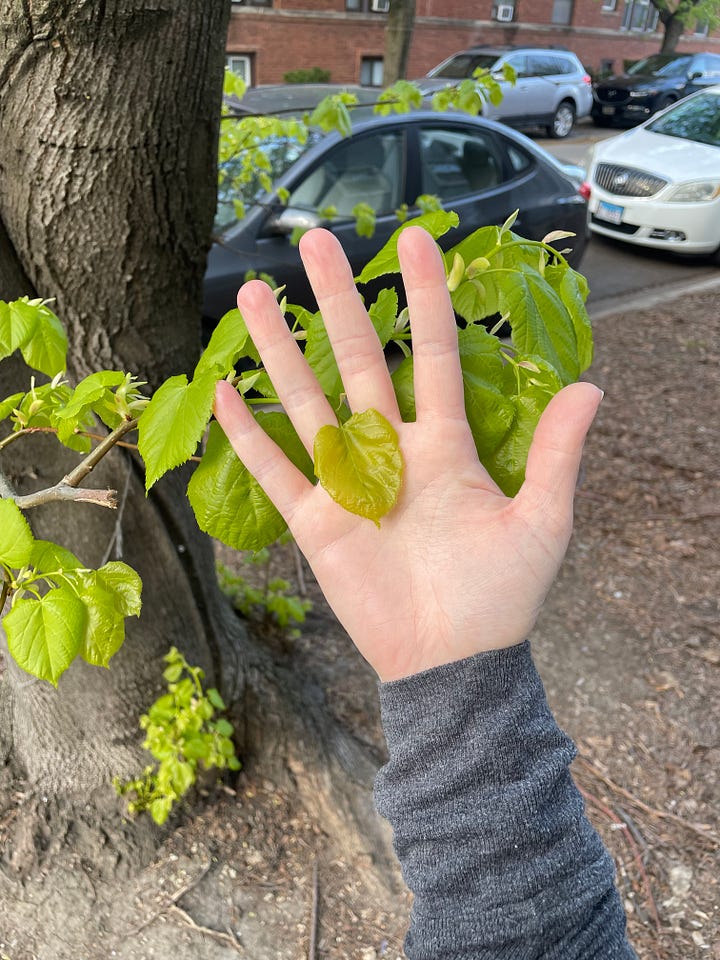
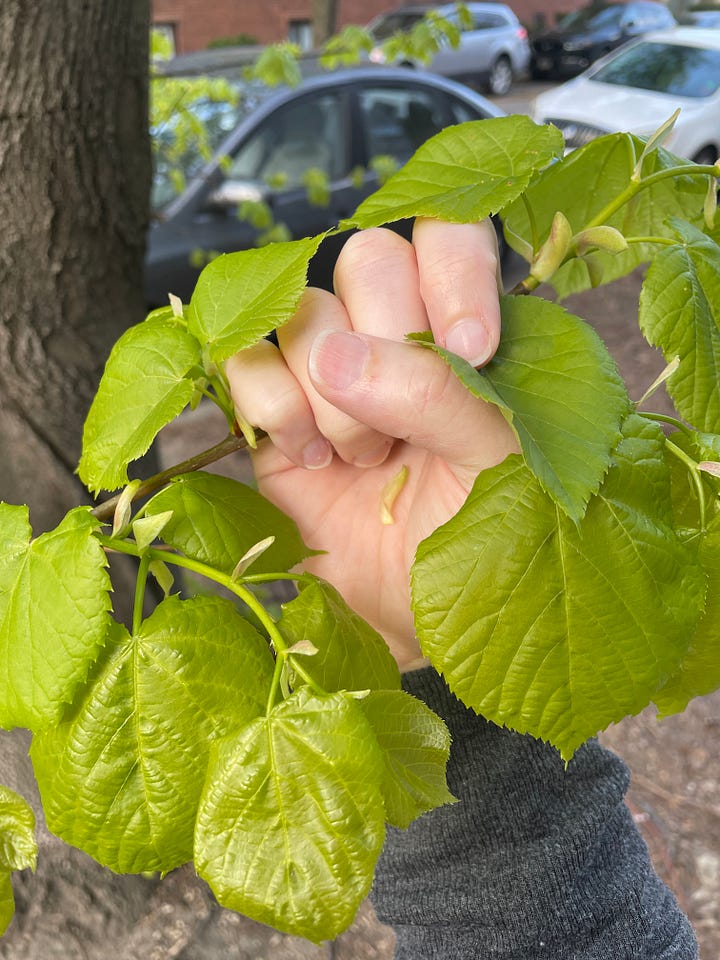

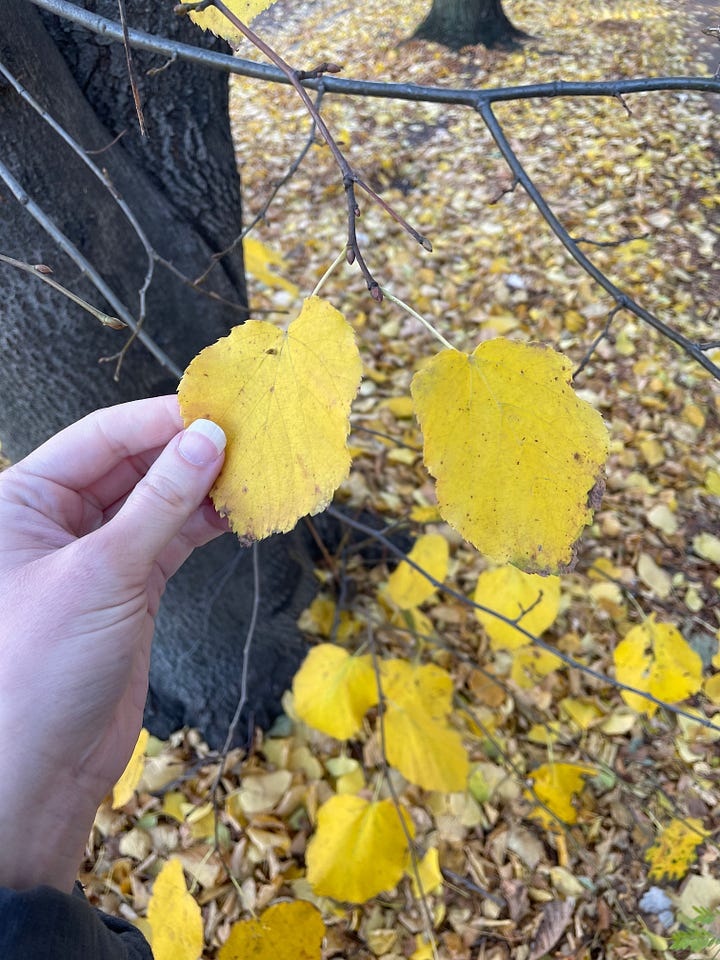
When we’re inefficient, we lose time. But what do we gain?
I would eat the last strawberry and rinse the plastic strawberry carton. I usually care a lot about efficiency, and I still spent ten seconds with an empty clear dripping plastic carton, rinsing it and shaking it off and putting it into the recycling I knew would become trash. In those ten seconds, I thought about the carton’s future. I thought about the berries I’d gotten out of it. I thought about the other recycling-that-was-actually-trash that this carton would sit on top of. And I remembered something I read in one of Rachel Marie Stone’s books, Eat with Joy, “Do not scorn the symbolic act.”
This is a necessary reminder for my efficiency-focused brain. A la Aristotle, let’s think of virtue as a golden mean: the ideal average between two extremes. One extreme is mindless time-wasting. The other extreme is efficiency that is brutal and inhumane. In the center, then, I hope to spend my time responsibly: sometimes be super efficient, sometimes be super thoughtful. The ability to move smoothly between both. It’s always been easy for me to see the value in efficiency. But something I’ve been thinking more about is the side that involves thoughtfulness. What is the value in slowing down?
I rinsed the trash. I considered the strawberries. I am training my mind to care about these things, this little trash. I’ve started thinking about sewing and thrifting. I’ve started thinking about only using seasonal decorations that I can make from what I have already and find out in nature. I’ve kept thinking about quitting meat, about finding more sustainable forms of protein, about the poor treatment of the animals I require be tortured by demanding I can consume them for cheap. I have almost stopped using ziplock bags completely, while I probably used two a day growing up. I’m thinking more about craft, about the value in making something slowly and well, about buying things I can keep and repair.
It’s just thinking. Thoughts we’re all thinking, for the most part—nothing special. Thoughts about small problems that are connected to big problems. Big problems that bring anxiety and stress and fear to an individual person who cares about the world and its people. It’s thinking—not policy research or a protest or lobbying my local politicians. I’m just thinking. I occasionally act, make a little individual decision.
And that will not save us. I will not save us. Thinking small and not acting is, in a major sense, a privilege. If your neighborhood is being polluted or your country is overrun with violence or you live somewhere where the opioid crisis is especially acute, you are materially affected at scale. Thinking small is not an option. Not acting is not an option. You take a second or third job to pay the AC bill, move cities or states or countries, lobby and demonstrate and research and canvass.
I know this. I hate this. I am privileged and sorry and yet.
And yet there are so many problems. I am acting sometimes. I am tired. I am stressed. I am selfish and don’t prioritize things well and haven’t volunteered at my local food pantry in months. I feel the uselessness of not being an executive at one of the 10 companies that make the 90% of pollution. I feel the crush of climate change and environmental racism and all the other sides of racism. I am afraid of our current political polarization. I remember the fact that all plastic that has ever been created still exists. Creepy companies sell our data and have cameras in our homes and I feel overwhelmed from every side and I get stuck. I go back to my small world and my hobbies and habits and the phones that siphon our attention. Of course we do.
And this is when I remember: Do not scorn the symbolic act. The “symbolic act” has been for me a bridge between panic about a burning world and the selfishness of hunkering down into my own insulated-enough life. I did not wash the strawberry container so it could be turned into something new. I washed it to pause and think. I washed it as a discipline that required I spend my time on something acutely futile but chronically fruitful.
A symbol is something that stands in for something else. A symbolic act is an act that is practically useless but essentially meaningful.
It reminds me of a story Chanel Miller told in Know My Name. At this point in the book, she’s told the story of the night she was assaulted, the waiting and misery of the trial and sentencing. She moves to a little house in San Francisco with her boyfriend, and when he travels for work and night falls, she barricades the front gate and turns on all the lights and lies on the couch with scissors and pepper spray. She can’t sleep, because she fears being unconscious, because she was assaulted when she was unconscious.
Chanel and Lucas decide to get a dog. She was thinking they’d get a Rottweiler or German shepherd, something powerful and intimidating. But they ended up fostering dogs for a year, most of whom were disabled. The foster dog she ended up adopting was not a guard dog. It was small and weak. It needed to be hand-fed and would not protect her from a dead leaf. She writes, “This wasn’t the plan. Fostering was temporary until we got a big, blusterous dog. After an assault, the world tells you to put your guard up, fight back, be careful. […] Nobody says, Adopt the Pomeranian. I had planned to surround myself with higher gates and sharper teeth, but maybe that was not what I needed. Maybe it was possible to build that security within myself” (269). She writes about cleaning up after the dogs’ messes, taking them on walks, feeding them and using that as a cue to feed herself. “I was reminded that having extra needs does not make you too difficult, too time consuming, but worthy of compassion and love” (268).
The purpose of a guard dog is to guard. The purpose of the six dogs she cared for and the one she adopted was their inability to guard. Their very existence was a reminder to Chanel that she could be weak and needy and not strong all the time, and this was okay.
Adopting a disabled dog is a symbolic act.
Pretend-recycling is a symbolic act. (Not one I recommend, even.)
I have learned to value the symbolic act. Something that makes me slow down. Something that sinks me into a paradox. Something that doesn’t make me solve anything, but doesn’t let me zone out either.
I was reading Mark recently and found a symbolic act. I’ve heard the story before, and it still floored me:
Jesus is days away from dying. He’s been telling his disciples this in parables and outright, but they don’t want to hear it. Who would? He’s eating dinner at someone’s home, and a woman comes up and anoints him with expensive oil. The people around him grumble, and in some versions give her a hard time, “That oil was worth a year’s salary. She should have sold it and given the money to the poor.”
But Jesus—who has just been anointed by this woman, in some versions cried over, touched with love and reverence and sorrow—Jesus disagrees. I think about his body, this body he’s lived in as a human God for 33 years, this body that’s about to suffer and die and he knows it. I think of how dread feels when it knots in my stomach and imagine him anticipating this weight, human history’s entire sin. I think about him getting haircuts, pushing sweaty hair off his forehead as he walked between little fishing villages, about his callused human feet and about a woman touching him and crying over him and comforting his sore, real, physical body. I think about moments when I’ve been given lavish gifts, where speechlessness expresses delight, my gratitude for candlesticks or anything undeserved. Month after month after month Jesus seeks people out, Jesus touches people, Jesus heals people, Jesus gathers crowds and talks to them. Jesus goes. And people come, too, people follow him, they search him out, they invite him to their homes and towns, but more often than not it’s when they want him to heal someone. They need him. And he is used to being needed—he is literally God—but he is also experiencing his own bodily need for 33 years, experiencing weakness, literal weakness. And 33 years into this life, one week before this life runs into death, a woman comes and finds him only to give him a ridiculous, expensive gift through a ridiculous, heartfelt act. Maybe the most fancy gift he’d gotten since the frankincense and myrrh and gold, and maybe he was too little to remember that, and maybe in this moment he misses his mom and being a kid and he misses the future where he’ll have gotten the dying part over with and surely he misses having power and omniscience but in this one moment he is wrapped in the beauty and horror of being fully human: love through touch. Love through her financial sacrifice. Love despite ridicule.
And what does he say?
“She has done for me what she can.”
“She has done a beautiful thing to me.”
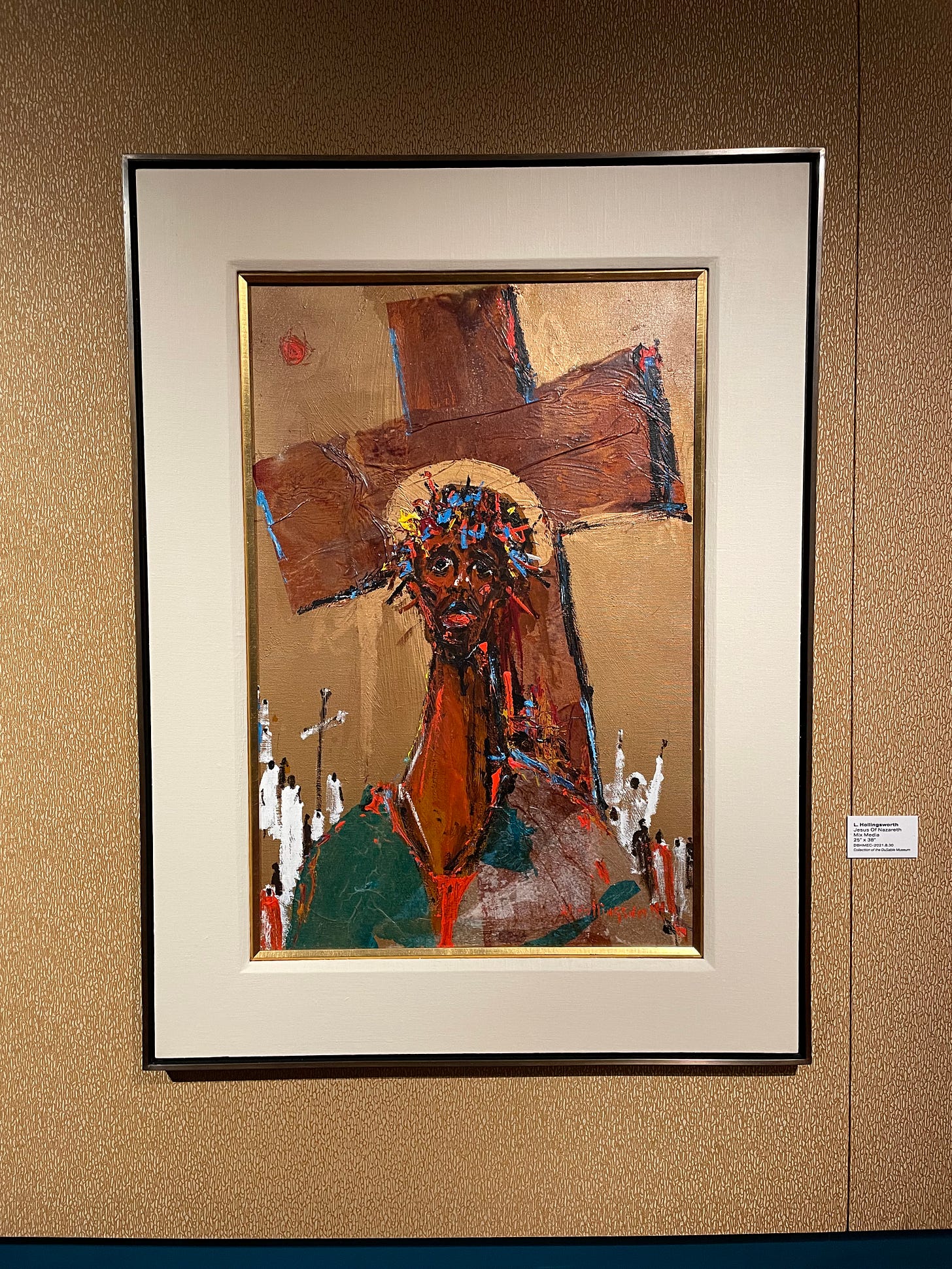
He was staring at a deadline that none of his best friends could see. And this woman walks up and anoints him. I don’t know where she got the idea or how she acquired the oil or who even she was, but she stepped in and honored his need. He was a dying God. He was afraid. He was all-too-powerful and all-too-human and he was going to be buried for three days and finally someone acted like it. Someone prepared a way for him. He who was going to suffer and die and in doing so prepare a way for the rest of us.
The other people at the dinner tried to argue that the woman was being inefficient and therefore wasteful. But in this moment, at this dinner party, a God is sitting in the body of a man, a man about to die for humanity, and a woman honors him with as much as she can, which is still less than he deserves, and more than his closest friends imagined. She was attuned to the value of the symbolic act.
I would fix every problem right now if I could. But that idea is impossible. That sentence is ridiculous.
Sometimes, all I can do is something that’s silly. It’s silly but it requires me to sit with the problems of the world. To be present for the paradoxes.
The silliness will eventually stop. Occasionally, though, the silliness will blossom. A symbolic act leads to a discipline of thoughtfulness. This discipline of thoughtfulness keeps me engaged. Enough to take small and large actions when I am ready. Engaged enough not to, but to stay open, fragile, ready to learn and be broken with the brokenness of the world.
When I was a little girl, I didn’t cry. I wanted to, sometimes. Like when I thought I’d get cast as Snow White in Snow White, maybe, hopefully, but got cast as the evil witch instead. I played it off and had ten seconds alone in the stairwell and I remember just stuffing down everything—this doesn’t matter, don’t cry, this isn’t worth it, you’re fine. Pound up the stairs two at a time. Now go to class. I wanted to cry, but I valued being tough more.
At some point, though, I realized that my true value system actually welcomed crying. When I cried, I allowed myself to engage with the brokenness of the world. I wanted to be broken by the things that are broken in the world. So I changed my mind. I decided, I am someone who cries.
Crying, I believe, is a symbolic act. Tears don’t water plants. They don’t hydrate your skin; they probably dehydrate your body. But they are an outward symbol of inward brokenness. They connect our spiritual pain with our physical body: I feel overwhelmed, I feel sad, I feel hurt. Or, in the case of the woman with the perfume, I feel sad because you feel sad. I feel sad because you are going to be hurt. And I am with you—see? These tears from my body, they are for you. Later, the soldiers will give you sour wine, but right now, I give you water and perfume.
Symbols of our love.




